#statistics data analysis
Explore tagged Tumblr posts
Link
We often hear the risk of death or disability associated with COVID described as being “low” or “high.” Confusingly, different people can respond to the same number with very different qualifiers. Just how risky is COVID compared to other risks in our lives? We dig into that in this article.
...
Statistically, you can expect to run with the bulls 18 times before your cumulative risk of injury exceeds 50%. Beyond that point, the odds begin to stack against you. It takes 77 excursions before you can be 95% confident that you will get injured.
For such a seemingly dangerous sport, those numbers aren’t that bad. The per-infection chance of developing symptomatic Long COVID is 14.6% according to Statistics Canada. With these numbers, you can get infected with SARS-Cov-2 4 times before your risk of Long COVID approaches a 50/50 chance. After 19 infections, your cumulative risk approaches near certainty at 95%.
We would rather run with the bulls.
#understanding risk#risk perception#risk analysis#chance#covid#long covid#probability#statistics#data#cumulative risk
82 notes
·
View notes
Text
TDP Colour Association Survey
I wanted to try something a little wild and wacky with all of you. Below is a survey of different TDP characters - asking what colour you most associate with them:
I’d really appreciate it if you filled it out! I’d super DUPER appreciate it if you shared it with others to boost the sample size. When I have enough responses I want to be able to post the results here for everyone.
Just some things to mention first:
This is completely anonymous - I won’t have access to any personal information. All I’ll get on my end are the answers you’ve chosen
This is completely voluntary - I can’t force you to take this survey, you are free to skip any questions you don’t feel like answering
There is no guaranteed outcome - I really want to post the findings, but that depends on the number of participants I get in the end. I also can’t compensate you for your time with anything other than a thank you
With that out of the way, thank you for reading my spiel. If you’re interested in helping, fill out the survey and/or spread it around (reblog, share, etc) so others can respond!
#i’m studying to be a researcher atm so this is kind of like practice#(not that i intend to do some insane statistical analysis with the data tho)#the dragon prince#tdp#tdp fandom#tdp headcanons#continue the saga#give us the saga#greenlight arc 3#catcher writes (writes!)#<- this time it’s writing a report?#(tagging SOME of the characters included in the survey to boost reach)#tdp aaravos#tdp amaya#tdp astrid#tdp callum#tdp corvus#tdp ezran#tdp nyx#tdp janai#tdp rayla#tdp runaan#tdp soren#tdp terry#tdp viren
44 notes
·
View notes
Text

#tua#the umbrella academy#klaus hargreeves#luthor hargreeves#diego hargreeves#allison hargreeves#five hargreeves#ben hargreeves#viktor hargreeves#victor hargreeves#pogo hargreeves#grace hargreeves#reginald hargreeves#statistic#statistics#datascience#data analytics#data analysis#data
21 notes
·
View notes
Text
Atlanta Fed shock sounds 'Trumpcession' warning: McGeever
Trump is deliberately tanking the economy and then trying to cover it up with more firings and cooking the books. If no federal economic data is reliable then no one can trust it for things like investments, business decisions, government planning for economic downturn, etc.. This is yet another essential step in the Republican plan to ruin the economy for the benefit of Vladimir Putin and a hand full of Billionaires so rich they benefit if there is stagflation, or even worse deflation.
There is no non-sinister reason to do any of this.
Trump administration disbands two expert panels on economic data
Trump Advisers Want to Strip Public Spending From the GDP Tally. Why It Makes No Sense.
#Trumpcession#GDP#Donald Trump#US Economy#tariffs#Mass Firings#spending freezes#News#economic data#War on the Economy#Commerce Department#Howard Lutnick#FESAC#the Federal Economic Statistics Advisory Committee#Bureau of Economic Analysis Advisory Committee#Public Spending#Elon Musk
17 notes
·
View notes
Text
youtube
Statistics - A Full Lecture to learn Data Science (2025 Version)
Welcome to our comprehensive and free statistics tutorial (Full Lecture)! In this video, we'll explore essential tools and techniques that power data science and data analytics, helping us interpret data effectively. You'll gain a solid foundation in key statistical concepts and learn how to apply powerful statistical tests widely used in modern research and industry. From descriptive statistics to regression analysis and beyond, we'll guide you through each method's role in data-driven decision-making. Whether you're diving into machine learning, business intelligence, or academic research, this tutorial will equip you with the skills to analyze and interpret data with confidence. Let's get started!
#education#free education#technology#educate yourselves#educate yourself#data analysis#data science course#data science#data structure and algorithms#youtube#statistics for data science#statistics#economics#education system#learn data science#learn data analytics#Youtube
4 notes
·
View notes
Text
17.05.24



The weather is nice again! I'm glad the rain definitely dampened my mood.
I spent almost the entire day in the library- found 'You will beat this essay' written on the cublicle wall, it gave me the motivation I needed to get a big chunk of my Lab reoprt done.
Today I;
Did the introduction of my lab report
Did the methodology of my lab report
Created the Figures for my lab report
Started to contact the study abroad students I will be travelling with
Studied social categorisation, stereotyping and prejudice
Studied intergroup relations and conflict
I went to the library and forgot my tablet, so I had to walk all the way there and alllll the way back.
#psychology#psychology student#psychology studyblr#university#study#studying#student#lab report#data analysis#statistics#stroop test#methodology#aesthetic#study aesthetic#chaotic academia#academics#college#social psychology
19 notes
·
View notes
Text
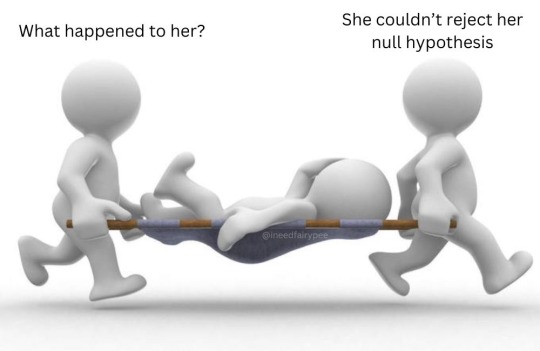
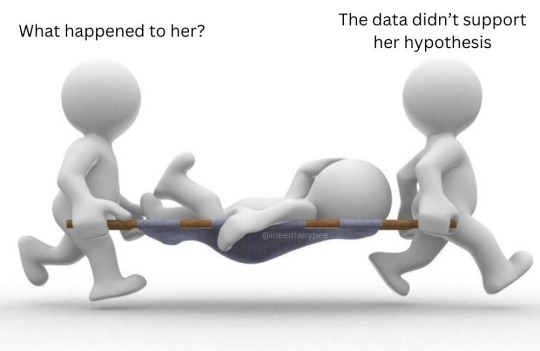

Casualty 🚑🚨
#student memes#uni memes#university memes#student life#dissertation#dissertation memes#dissertation life#data analysis#psychology student#university#psych student#student#uni life#research project#final year project#stats#statistics#university life#university student#research memes#research life#regression#spss#statistical analysis#null hypothesis#hypothesis#correlation#ineedfairypee#fairypeememes#I Need Fairy Pee
23 notes
·
View notes
Text
A note on Katharine Birbalsingh and Michaela Community School
The media narrative surrounding Michaela Community School in London mostly goes like this: Katharine Birbalsingh transforms poor inner-city (read: ethnic minority) children into academic superstars through the power of discipline. Thomas Chatterton Williams’s recent essay (full text here) in The Atlantic is merely the latest in a long line of fawning profiles that tout, implicitly or explicitly, Birbalsingh's iron fist as the solution to all that ails Britain. However, no article I have read so far has investigated other explanations for Michaela's high Progress 8 score nor endeavored to deconstruct the popular narrative surrounding the conservative superstar.
Williams begins the body of this piece by pointing out that Michaela “draws nearly all its students from Wembley, one of the poorest districts in London” in an apparent attempt to cast them as would-be low achievers, if not for Birbalsingh’s intervention. Although the characteristics of the individual pupils who attend Michaela have a greater impact on results than those of the school's neighborhood, he doesn’t bother to investigate how they differ. Among Michaela pupils who sat GCSEs over the past three years and whose prior attainment at Key Stage 2 (measured by an exam at the end of primary school) were available, 31% were high achieving, 53% were middle achieving, and only the remaining 16% were low achieving. For those who are uninterested in learning the nuances of British exam scoring, that means Michaela’s pupils were exceptionally bright even before they entered the school.
Birbalsingh furthers her savior narrative by describing Michaela's intake with unquantifiable terms such as "challenging" or "inner-city." However, only 28 of Michaela's 2024 GCSE takers (24%) were disadvantaged per the government's definition, "those who were eligible for free school meals at any time during the last 6 years and children looked after," in line with the national average of 25%. Although Birbalsingh likes to advance the narrative that she improves the academic performance of poor children—to be fair, she does, at a rate of roughly 30 individuals per year—she mostly improves the GCSE performance of middle class children.
Michaela's pupils are also self selecting, and therefore they are not representative of pupils in Wembley, London, or the UK as a whole. Any pupil who wishes to attend state secondary school in London must fill out a form indicating their top six choices, and they will be placed in one of those schools based on geography, demand, and availability. A pupil who does not wish to attend Michaela can leave it off their application, guaranteeing they won't attend. Therefore, Michaela is left with an intake of pupils who largely want to be there. By my calculations, Michaela's classwork and homework demand just over 49 hours of work each week. Although this does lead to good results, many teenagers would not abide by this; the 40-hour workweek is taxing even for most adults, who are blessed with more waking hours. Michaela's model and results cannot be easily repeated at any given school—at least not without systematic exclusion.
Williams unintentionally misrepresents a statistic when he asserts that “More than 80 percent of Michaela graduates continue their studies at Russell Group Universities.” He lacks a sufficiently deep understanding of the British school system to interpret this figure. While Michaela’s website states that 82% of its 2021 sixth form alumni attended a Russell Group university, it does not provide data on the university attendance of graduates from its secondary school, the disciplinarian institution which Williams profiles.
In the UK, sixth form (years 12 and 13, spent studying for A-levels) is separate from secondary school (years 7 through 11; the last 2 years, KS4, are spent studying for GCSEs). For Michaela, this also means a different admissions process. While there are no academic minimums to enroll in the secondary school, the sixth form requires an impressive average GCSE score of 7. Michaela has the capacity to enroll 120 students in each year of sixth form. However, the sixth form was under-enrolled by half in 2024. Michaela is a publicly-funded school, so this begs the question as to why state resources are not being utilized to their maximum capacity. The sixth form could educate more students simply by lowering GCSE requirements, but that would of course lead to less impressive university admissions—the kind that may not be displayed on Michaela’s home page. It is also possible that some secondary teachers would be pulled away to teach A-level subjects, worsening GCSE results, but that is speculation.
Thus far, all discussions of Michaela’s results have been woefully incomplete because they have not examined the effect of its narrow curriculum on its exam scores, instead focusing on the behaviorism that makes Birbalsingh’s authoritarian acolytes salivate. Williams's article is no different, only mentioning in passing that she believes “the national curriculum might force her to lower her own standards.” Depending on what changes the new Labour government implements, a revised national curriculum may indeed clash with Michaela’s philosophy. The school directs virtually all of its resources toward preparing pupils for its narrow selection of GCSE subjects or the few non-GCSE subjects that are required by the current national curriculum, such as PSHE, music theory, or PE. Birbalsingh is so focused on GCSE revision that she does not even believe volunteer work to be a "financially viable" option for Michaela pupils. Michaela's extra-curricular clubs all have a marginal cost of practically zero. In fact, several of them directly support curricular subjects, so they should rightfully be considered part of GCSE preparation.
A narrow curriculum obviously allows pupils to spend more time studying each GCSE subject they sit, thereby increasing their exam scores. Since most of the GCSE-level classes that Michaela offers are mandatory, pupils have little freedom to choose their own subjects (more on that later). Aside from that, cohort sizes stay remarkably close to 120 from year to year, and the school seems to impose a soft cap on classes of 30 pupils (120 / 4 = 30), so Michaela can hire the exact number of teachers it needs each year on a full-time basis. The school never needs to "waste" money hiring teachers for undersubscribed subjects, so it can also raise test scores by investing more in its core subjects than schools with broader curricula can afford to. On the flip side, Michaela does not offer dramatic arts, orchestra, individual sciences, computing, design and technology, foreign languages besides French, or a whole host of other popular subjects at the GCSE level. Other schools could easily raise their GCSE scores by slashing their curricula down to Michaela levels, but they offer a variety of classes because they care about their pupils experiencing joy and exploring a variety of career paths more than they care about their P8 scores.
For years, all of Michaela’s pupils have studied the same subjects at GCSE with some slight variations. A handful of pupils always sit for exams in heritage languages, but otherwise, the following paragraphs demonstrate approximately how the subject breakdown has looked over the past three years. (Earlier data has been distorted by COVID, or it is incomplete or outdated.) At the time of publication, 2024 data can be found here, while older results can be accessed through the link “Download data (1991-2024)”.
- 2022: 100% of pupils: English language, English literature, combined science, mathematics, religious studies. ~75%: French, geography/history. ~25%: Citizenship. ~25%: Art & design: photography, art & design: fine art. (I had to recreate this year from memory because individual subject entries do not appear to be retained in older data, but it is accurate to the best of my recollection.)
- 2023: 100% of pupils: English language, English literature, combined science, mathematics, religious studies. ~75%: French, geography/history. ~25%: Art & design: photography, art & design: fine art.
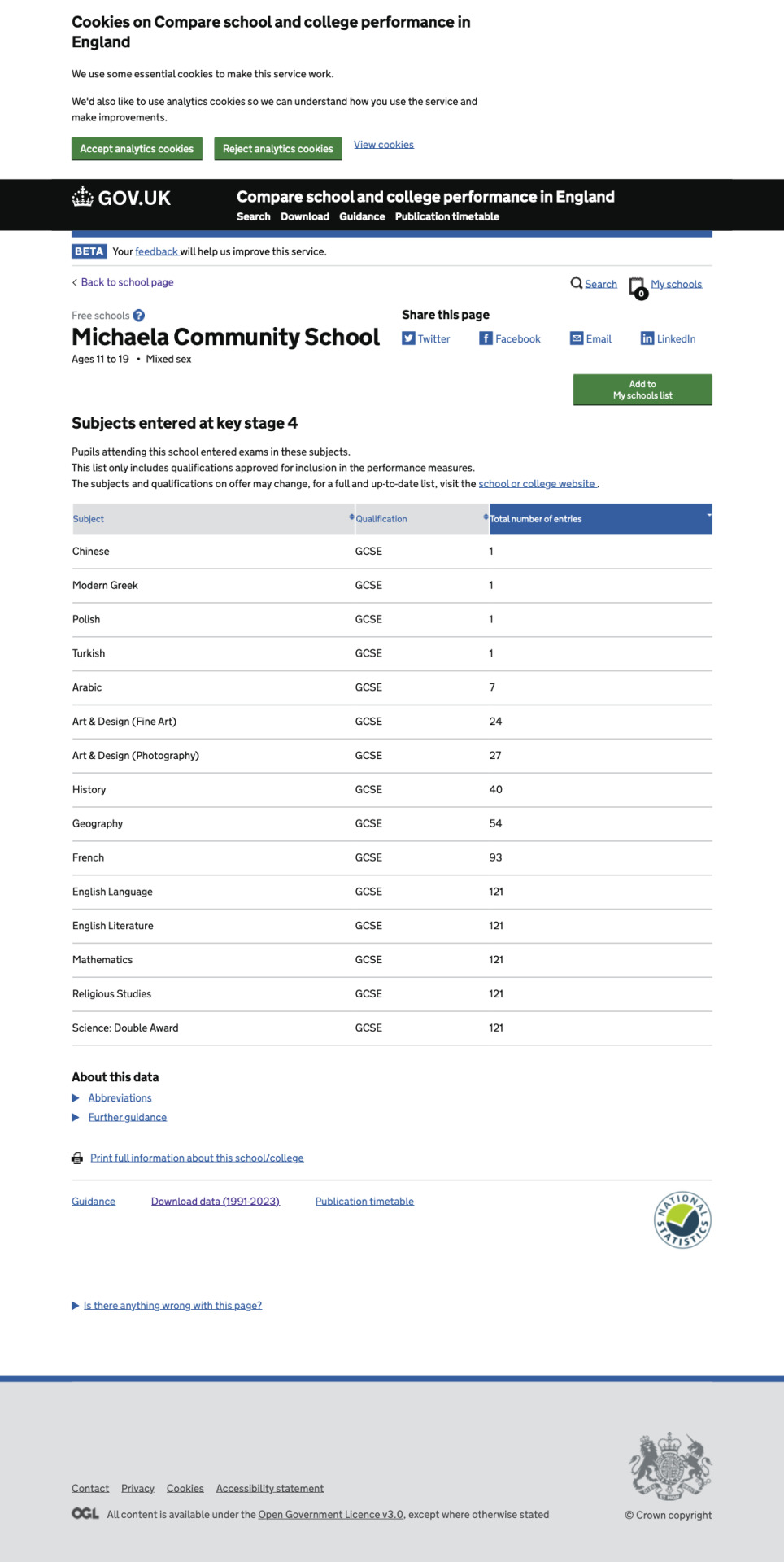
- 2024: 100% of pupils: English language, English literature, combined science, mathematics, religious studies, French. * ~80%: Geography/history. ~20%: Art & design: photography.
*This year, 3 pupils sat for biology, chemistry, and physics separately instead of taking combined science, but there is no explanation for this on Michaela's website.
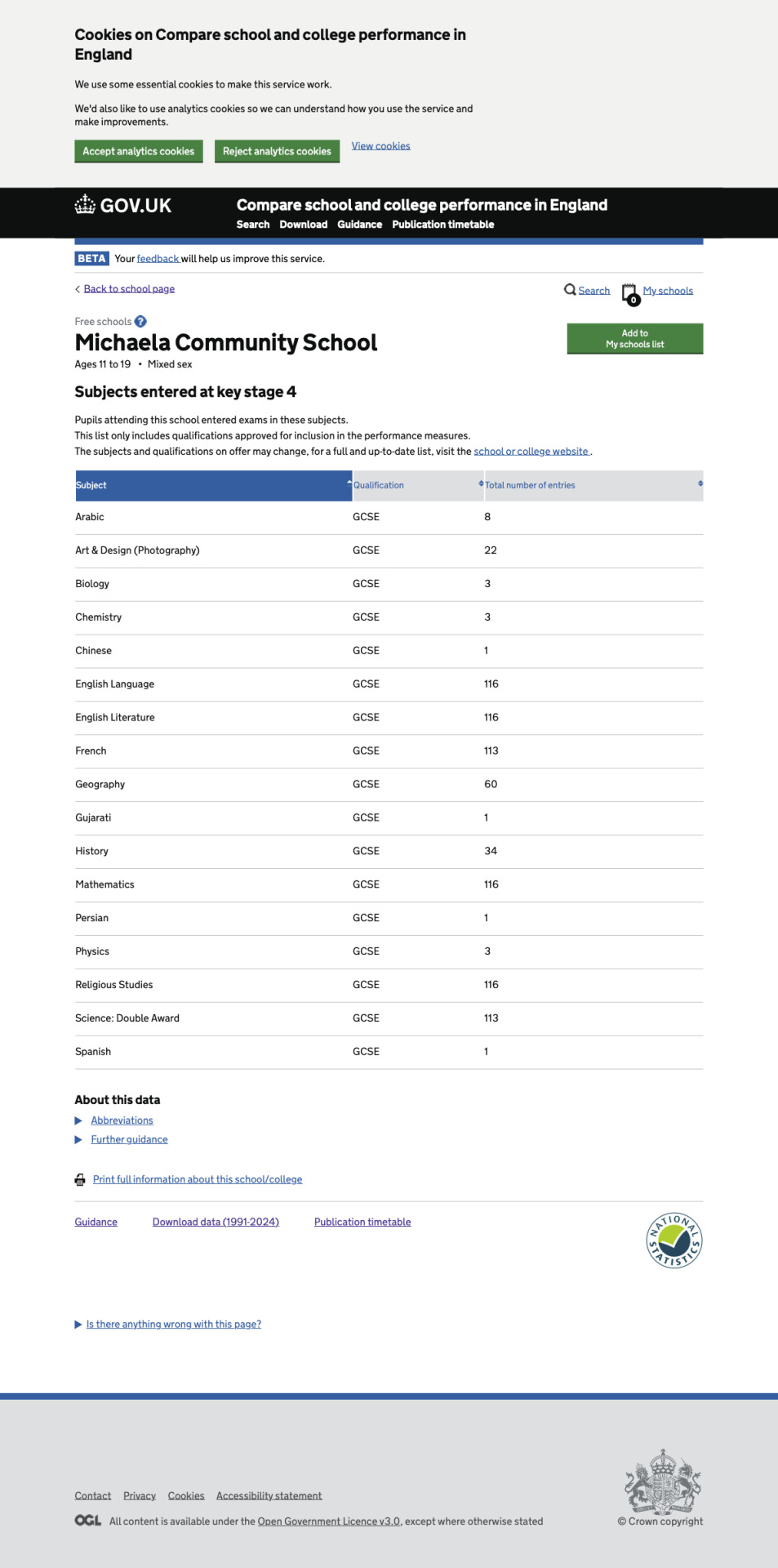
Each year, about 90 Michaela pupils enter for the EBacc, a set of GCSE subjects encouraged by the British government. This usually works out to 75% of a cohort, but in 2024 it was 81% (94 pupils) because the cohort size was smaller than usual at only 116 pupils. Still, that means the largest class of EBacc entrants was only 32, in line with Michaela's projected class size of 30—despite Birbalsingh asserting that "class size matters little for success." Although the school comparison website does not list subject selections for individual pupils, it was easy to see how subjects were combined by cross-referencing exam entries per pupil and total entries per subject.
In 2021-2022, the pupils who did not enter for EBacc studied citizenship but neither French nor humanities. The study of art did not appear to correlate with EBacc entry.
In 2022-2023, the pupils who did not enter for EBacc studied photography and fine art but neither French nor humanities. Citizenship was dropped from the curriculum.
In 2023-2024, the pupils who did not enter for the EBacc studied photography but not humanities.
EBacc entry varies little across different pupil demographics such as gender, disadvantage, or English as an additional language. However, there is one characteristic that strongly determines EBacc entry at Michaela: prior attainment (PA). Over the past three years, out of 323 pupils for whom the PA data is available, 23% of low-PA pupils have entered the EBacc. This number is 83% for middle PA and 99% for high PA. According to my statistical analysis, the chance of these disparate "choices" arising without intervention is less than one percent.
At the end of Key Stage 3, Michaela staff pick approximately the top 75% of performers to enter for EBacc and require the lowest 25% to study other subjects.
This explains why only a few low-PA pupils enter for EBacc: although they are likely to remain in the bottom of their cohort throughout their schooling, some may improve enough to enter the top three quartiles. Although I am fully confident that my statistical analysis supports my assertion that Michaela pupils are not permitted to choose their GCSE subjects, the school has never disclosed a rationale for this practice, so the remainder of this essay will be speculation, not fact.
Michaela frequently boasts of its high Progress 8 (P8) score, and in order to understand my hypotheses, I recommend you familiarize yourself with its calculation. P8 is calculated by comparing actual Attainment 8 (A8) scores with expected scores based on Key Stage 2 (KS2) performance. This PDF explains how A8 scores are derived. (For my purposes, I will count double science as 2 GCSE subjects.) Therefore, a school with a non-selective intake such as Michaela can only change its P8 score by changing its A8 score.
Over the past few years, Michaela has refined its placement technique, presumably to increase its A8 scores. Pupils of any ability were permitted to study art at the GCSE level in 2022, but that option was removed the next year, probably so that high performers could devote more energy to EBacc subjects. Low performers who would have studied citizenship in 2022 instead studied art in 2023. Perhaps a part-time citizenship teacher would no longer be needed, and more resources could be directed to core subjects. All pupils studied GCSE French for the first time in 2024, giving each pupil 3 EBacc qualifications and finally maximizing A8 scores. However, the poorest performing 25% did not study humanities at KS4. This meant that approximately 120 * 2 * (1 - 0.25) = 180 pupils did study humanities at KS4, so with a typical class size of 30 and 6 class periods per day, one teacher could have accommodated all of them. If poor performers had studied humanities as well, hiring another teacher may have been necessary (and we already know how protective Michaela is of its budget).
The curricula for high and low performers are now identical, except for poor performers studying photography instead of humanities. Working from the assumption that Michaela intends to maximize its A8 score, this leads to one or two conclusions: it believes that poor performers will score higher on photography than French, and/or it does not want to expend humanities resources on poor performers because allocating them exclusively to high performers will raise the A8 score more. Similarly, no Michaela pupil has entered for more than 8 GCSE subjects (barring heritage languages, which do not demand too much revision time) since 2022, almost certainly to improve A8 scores. A limited class schedule allows pupils to devote more revision time to each core subject, while more exams would not raise A8, even if they did expand pupils’ horizons.
In the matter of GCSE curriculum, Michaela’s website is outdated and incomplete. It still enumerates the KS4 fine art curriculum, even though the subject was not offered at the GCSE level in 2024. It doesn’t mention that only three-quarters of pupils will study GCSE history or geography, so some parents who expect their children to study the humanities past age 13 may be in for a nasty surprise. Of course, this begs the question, what does Michaela have to hide?
It is difficult to understand how these prescribed schedules advantage Michaela’s pupils. Does the school not enroll maths whizzes who are determined to enter for mathematics, further mathematics, and physics at A-level, but who want one last artistic hurrah before starting sixth form? Are none of the poor performers averse enough to art that they'd prefer history? These prescriptions do not necessarily benefit Michaela’s pupils, but they do benefit the school’s P8.
Finally, Williams closes his article on a nostalgic note, contrasting his childhood with that of the Michaela pupil: “…my friends and I were free—luxuriously so—in ways these children possibly couldn’t even imagine. But that freedom that so many underprivileged and minority children bask in isn’t worth a damn thing if it leads to an adulthood boxed in by self-inflicted limitations.” Since the author was raised by college graduate parents and educated in private schools, and he is now a successful writer, he seems to believe that children who grow up rich can thrive on freedom, but the same is not true of the poor. Birbalsingh similarly believes that disadvantaged children need extreme discipline to succeed. However, she does not want to create a world where child poverty is eradicated so that every pupil can experience freedom, joy, and success at the same time. In fact, she envisions the opposite. She has spoken out against free meals for primary schoolers because she believes (without evidence!) that it would somehow make their parents less responsible. Even this concern were legitimate, it would pale in comparison to the necessity of feeding hungry children.
In the end, my dislike of Birbalsingh stems from her incredibly bleak worldview. She maintains that children should face the threat of starvation so their parents will be motivated to work harder. Even when testifying before Parliament, she believes the sexism that drives differences in A-level subject choices should remain unexamined. She propagates furry hoaxes—originally spread to mock trans people—to exemplify a supposed lack of discipline from parents. She believes if you don’t decorate your house for Christmas, you are destroying the country, and it is also somehow Vishnu’s problem (yes, the letter is truly that bizarre, and I recommend reading it for full effect). In her ideal world, she imagines suffering for suffering’s sake, a boot stamping on a human face—forever.
#katharine birbalsingh#birbalsingh#michaela community school#michaela#politics#british politics#uk politics#essay#longform#long form#data science#statistics#statistical analysis#education#education system#uk education#education uk#british education#united kingdom#london#wembley#i am a girl who likes hard maths
3 notes
·
View notes
Text
discovering Where The Math Is in something confusing is always such an immense relief
#been trying to learn data analysis for MONTHS now and i only just got a good big picture understanding of What It Is lmao#like. okay. you have some data#you come up with a clearly-defined question. you clean your data#you decide what statistical test is appropriate to answer the question & appropriate for your data#and. CRUCIALLY. deciding which one is Appropriate isnt just some sort of witchcraft!! they all have assumptions built in#often because of how theyre calculated#THATS JUST MATH!!!! i know how to do that#''you can only apply this thing in specific circumstances'' thats a theorem basically. 90% of my coursework in uni was theorems and proofs#still need to practice actually DOING data analysis & im sure ill run into some problems but. hooray! i think i know how to do this!#personal#numbers do not lie
6 notes
·
View notes
Text
For my personal contribution, I have 7-8 hours daily screentime. What about y'all???
And yes i reposted this bc i realized i put end poll after 1 week instead of 1 day🤡 lol
#tumblr polls#random polls#my polls#fun polls#discourse#screen time#tiktok#twitter#reddit#engagement#phone post#pls interact#discussion#discussion post#statistics#quantitative research#data analysis
1 note
·
View note
Text
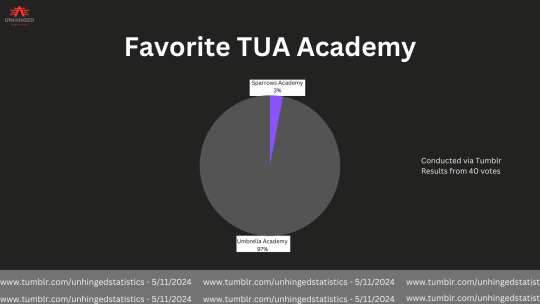
#the umbrella academy#umbrella acedmy#sparrows academy#tua#statistics#statistic#data analytics#datascience#data#data analysis
13 notes
·
View notes
Note
Do you think the clutch could have two fathers, retained sperm and meteorite? Thats where my mind went...
Hey friend!
That thought *definitely* crossed my mind, too! I ran the numbers on it to see if that was a reasonable hypothesis. After looking at the stats, though, I think it's pretty unlikely that Snikki retained any sperm from 2022. I'll show you how I came to that conclusion:
Last year's clutch from Snikki was with Chammers, and Snikki double-clutched that year. Her first clutch (SC22) was twelve eggs and the second clutch two months later (SC22B) was one good egg and five slugs. The sheer number of infertile slugs last year in SC22B gives me pause that any sperm could have been retained past that clutch.
Chammers is Anery het Amel, Hypo, and Lavender which is going to result in similar morphs to babies produced by Meteorite, who is Classic Tessera het Anery, Amel, and Hypo. The difference is that Meteorite would produce Tesseras (obvs) and a higher percentage of Classic color morphs than Chammers. Meteorite *can* produce a Ghost baby but the odds were only two in sixty-four and I only got twelve eggs, so statistically I should have seen less than one Ghost baby.
Chammers would be expected to produce about 50% Anery morph combos (Anery/Ghost/Snow), which he did, and Meteorite would be expected to produce only about 25% Anery morph combos, and SM23 actually came in a little lower.
While the morphs present in SM23 could suggest partial retained sperm from Chammers, especially for the statistically possible but improbable Ghost, there's still one thing that's making me think that these are all 100% Meteorite's babies.
Here's the Hypo and Ghost babies from SC22:


For comparison, here are a Hypo and Ghost from SM23:


Notice how much lighter the color is on the SM23 babies, how their pupils are ruby instead of black, and their irises are comparatively darker than the SC22 kiddos despite being lighter overall. All of the Hypos in SM23 are like this, and the Ghost following that same pattern tells me that they're all being subjected to the same Hypo gene expression.
Therefore, I'm pretty sure that SM23 are all full sniblings, and that would mean they're all Meteorite's.
#snake#snakes#reptile#reptiles#reptiblr#corn snake#corn snakes#sm23#text post#answers to questions#I'm no detective but I'm good at data analysis#call me Cornlumbo#This is why it's so important to keep breeding records#If I learned anything taking statistics in college it's that statistics are all bullshit#also statisticians are maybe not great people?#my college stats professor was a genuine nightmare#I guess you can use math to justify your garbage opinions about the world but that doesn't make you cool or pro-social
27 notes
·
View notes
Text
What Are the Qualifications for a Data Scientist?
In today's data-driven world, the role of a data scientist has become one of the most coveted career paths. With businesses relying on data for decision-making, understanding customer behavior, and improving products, the demand for skilled professionals who can analyze, interpret, and extract value from data is at an all-time high. If you're wondering what qualifications are needed to become a successful data scientist, how DataCouncil can help you get there, and why a data science course in Pune is a great option, this blog has the answers.
The Key Qualifications for a Data Scientist
To succeed as a data scientist, a mix of technical skills, education, and hands-on experience is essential. Here are the core qualifications required:
1. Educational Background
A strong foundation in mathematics, statistics, or computer science is typically expected. Most data scientists hold at least a bachelor’s degree in one of these fields, with many pursuing higher education such as a master's or a Ph.D. A data science course in Pune with DataCouncil can bridge this gap, offering the academic and practical knowledge required for a strong start in the industry.
2. Proficiency in Programming Languages
Programming is at the heart of data science. You need to be comfortable with languages like Python, R, and SQL, which are widely used for data analysis, machine learning, and database management. A comprehensive data science course in Pune will teach these programming skills from scratch, ensuring you become proficient in coding for data science tasks.
3. Understanding of Machine Learning
Data scientists must have a solid grasp of machine learning techniques and algorithms such as regression, clustering, and decision trees. By enrolling in a DataCouncil course, you'll learn how to implement machine learning models to analyze data and make predictions, an essential qualification for landing a data science job.
4. Data Wrangling Skills
Raw data is often messy and unstructured, and a good data scientist needs to be adept at cleaning and processing data before it can be analyzed. DataCouncil's data science course in Pune includes practical training in tools like Pandas and Numpy for effective data wrangling, helping you develop a strong skill set in this critical area.
5. Statistical Knowledge
Statistical analysis forms the backbone of data science. Knowledge of probability, hypothesis testing, and statistical modeling allows data scientists to draw meaningful insights from data. A structured data science course in Pune offers the theoretical and practical aspects of statistics required to excel.
6. Communication and Data Visualization Skills
Being able to explain your findings in a clear and concise manner is crucial. Data scientists often need to communicate with non-technical stakeholders, making tools like Tableau, Power BI, and Matplotlib essential for creating insightful visualizations. DataCouncil’s data science course in Pune includes modules on data visualization, which can help you present data in a way that’s easy to understand.
7. Domain Knowledge
Apart from technical skills, understanding the industry you work in is a major asset. Whether it’s healthcare, finance, or e-commerce, knowing how data applies within your industry will set you apart from the competition. DataCouncil's data science course in Pune is designed to offer case studies from multiple industries, helping students gain domain-specific insights.
Why Choose DataCouncil for a Data Science Course in Pune?
If you're looking to build a successful career as a data scientist, enrolling in a data science course in Pune with DataCouncil can be your first step toward reaching your goals. Here’s why DataCouncil is the ideal choice:
Comprehensive Curriculum: The course covers everything from the basics of data science to advanced machine learning techniques.
Hands-On Projects: You'll work on real-world projects that mimic the challenges faced by data scientists in various industries.
Experienced Faculty: Learn from industry professionals who have years of experience in data science and analytics.
100% Placement Support: DataCouncil provides job assistance to help you land a data science job in Pune or anywhere else, making it a great investment in your future.
Flexible Learning Options: With both weekday and weekend batches, DataCouncil ensures that you can learn at your own pace without compromising your current commitments.
Conclusion
Becoming a data scientist requires a combination of technical expertise, analytical skills, and industry knowledge. By enrolling in a data science course in Pune with DataCouncil, you can gain all the qualifications you need to thrive in this exciting field. Whether you're a fresher looking to start your career or a professional wanting to upskill, this course will equip you with the knowledge, skills, and practical experience to succeed as a data scientist.
Explore DataCouncil’s offerings today and take the first step toward unlocking a rewarding career in data science! Looking for the best data science course in Pune? DataCouncil offers comprehensive data science classes in Pune, designed to equip you with the skills to excel in this booming field. Our data science course in Pune covers everything from data analysis to machine learning, with competitive data science course fees in Pune. We provide job-oriented programs, making us the best institute for data science in Pune with placement support. Explore online data science training in Pune and take your career to new heights!
#In today's data-driven world#the role of a data scientist has become one of the most coveted career paths. With businesses relying on data for decision-making#understanding customer behavior#and improving products#the demand for skilled professionals who can analyze#interpret#and extract value from data is at an all-time high. If you're wondering what qualifications are needed to become a successful data scientis#how DataCouncil can help you get there#and why a data science course in Pune is a great option#this blog has the answers.#The Key Qualifications for a Data Scientist#To succeed as a data scientist#a mix of technical skills#education#and hands-on experience is essential. Here are the core qualifications required:#1. Educational Background#A strong foundation in mathematics#statistics#or computer science is typically expected. Most data scientists hold at least a bachelor’s degree in one of these fields#with many pursuing higher education such as a master's or a Ph.D. A data science course in Pune with DataCouncil can bridge this gap#offering the academic and practical knowledge required for a strong start in the industry.#2. Proficiency in Programming Languages#Programming is at the heart of data science. You need to be comfortable with languages like Python#R#and SQL#which are widely used for data analysis#machine learning#and database management. A comprehensive data science course in Pune will teach these programming skills from scratch#ensuring you become proficient in coding for data science tasks.#3. Understanding of Machine Learning
3 notes
·
View notes
Note
Hey you probably already know this but thought I'd make sure. Statistical analysis is good job for disabled people. They'll usually let you do it from home and be a bit weird (aka have any accoms ever) bcus stats is maths and ppl think math doers are wizards. Also a lot of places need stats work done, big field. Idk if you have any idea how stats work but you have a masters degree you're almost certainly smart enough to teach yourself enough stats and excel to work in the field, every psych major learns it and psyc majors hate maths. Dw if you're not a maths person maths ppl hate stats bcus its not real maths its too easy. So yeah. Good field to work in. Worth a look if you haven't yet? Sorry if completely irrelevant to you and good luck!
Thanks for the info! I was actually pretty good at statistics when I was doing my master's (we had a very strict prof who demanded A Lot from everyone) and I know R. Issue is, most jobs that I've seen for data analysis or statistics or anything of the sort require degrees in math or statistics or IT. Also I've forgotten a decent amount of stuff because I wasn't using it much in the last two years (I know it's weird that I was in a PhD for two years and wasn't using statistics, it's a long story).
So yeah, it's something I've considered but it's probably not an option with my education, at least in my country.
#ask#i don't mind data analysis and statistics so it would probably be a good option as well#but ive looked at everything and even entry level positions that don't require experience want math/stats degrees#also SQL which i have never used...#so yeah. probably not gonna happen
2 notes
·
View notes
Text
Online Data Science Courses
IIM Skills offers a variety of online data science courses designed to develop essential skills for the field. The course cover various topics statistics, machine learning, data visualization, and Python programming. The courses is designed in such a manner that a learner gets a theoretical knowledge and also a practical applications, often including hands-on projects. IIM Skills also emphasizes career support and mentorship, making it a suitable choice for both beginners and those looking to enhance their data science expertise.
2 notes
·
View notes
Text
relearning how to use my high school graphing calculator LMAO but like not me being excited to do real math again pls
#like it wont be Much math#but i Am taking like statistics and it Is real math lollllll#i havent actively done Real Math in... a long time#ive done fake math. like voter math and campaign math and even data analysis math#but none of that is like... challenging yk. so this shall be a change#im excited 😭😭😭#and ill have Some real math on econ too im sure but prob not a lot
3 notes
·
View notes